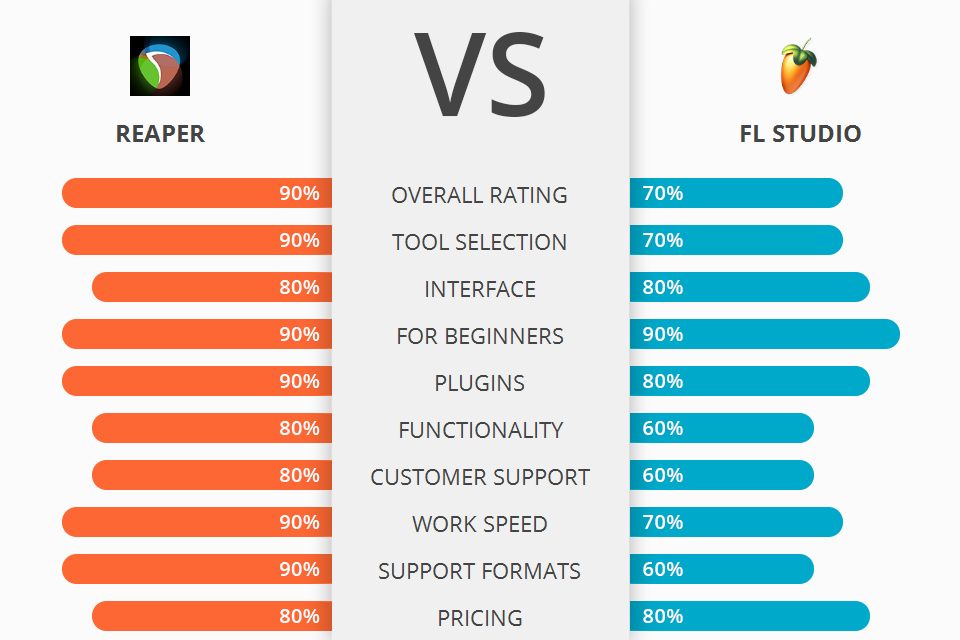
Tracks are just tracks, which do not need to be told what they are going to be. A good example of this is REAPER’s approach to tracks if you are looking for audio tracks, versus ones for busses, or instruments, or video you are going to be disappointed. That said, it’s true to say that users of existing DAWs can get caught out by its simplicity that is hiding in plain sight. As well as a fully configurable GUI, REAPER has thousands of shortcuts, macros, and controller setups available in the Actions list. REAPER is prized by many for its towering configurability. REAPER treats you like a reasonable, honest person.
#STUDIO ONE VS REAPER TRIAL#
Before you buy, there is a 60 day fully functional free trial before buying $60 or $225 personal or business licences that are perpetual with free upgrades, typically for around two versions’ worth of development.
#STUDIO ONE VS REAPER INSTALL#
After all, how much would you have paid for big studio functionality with limitless track counts in the pre-DAW era? Although REAPER is the same across the board, there are personal or business flavours of the licence that comes as a text file, and you can install REAPER on as many machines as you like provided you only use one at a time. 1 - Fair, AffordableĬonsidering the bottomless functionality offered by almost every major DAW out there, no single one of them could be accused of being overpriced. When I later needed something myself that filled in the gaps in my arsenal, the deal was already sealed. The platform proved to be an excellent choice, both in terms of functionality and support from Cockos. Following a period away from REAPER I turned to it several years later when tasked with configuring three multi-workstation educational suites that needed a blank-canvas DAW delivered to a budget. Having talked about it with him it struck me how its balance of configurability, stability, and affordability marked a different way of doing things that other platforms fell short on. I first became aware of Cockos’ Rapid Environment for Audio Production Editing and Recording around fifteen years ago when a friend started using it for music recording and mixing. Some will be reminiscent of those found elsewhere, while others are unique to the platform. These are just five of the features that make REAPER work for me. With this in mind, many engineers divide their everyday audio tasks between more than one tool on the understanding that as of yet no DAW can be a magic bullet for everything, all of the time. When working with any tool every day, its strengths and shortcomings for the job in hand become apparent pretty quickly. While some of this may be rooted in past experiences that no longer apply, most would agree that we are a long way from a total convergence when it comes to the different platforms’ functions and ways of working. Despite this, there still is a perception of ‘the best tool for the job’ that hasn’t quite gone away.

With the conversations about ‘which DAW is best’ becoming ever less relevant as features evolve and cross over, those new to audio could reasonably assume that there are no ‘bad’ DAWs out there. So I decided to stop worrying about which DAW to choose and start learning to use one.With many engineers using more than one DAW depending on the task in hand, Luke Goddard talks about the things that make REAPER one of his tools of choice. And at my level I am not even able to tell if Studio One or Reaper is easier. But I don't see that point coming anytime soon for me. I understand that at a certain level of user proficiency and complexity of projects, the ease of use can come into play as an important factor.
#STUDIO ONE VS REAPER HOW TO#
And once I learn how to do something from a tutorial or something, the design doesn't matter that much to me. The sleeker, simpler design of Studio One didn't help me solve problems or learn functions by itself - it's not intuitive enough for me to just guess how to get stuff done. So availability of resources is definitely an important factor for me.

When I want the DAW to do something, I have to google it anyway, watch a YT tutorial, or look up the manual. At my level, I really don't see a relevant difference. I used the free demo version of Studio One, and now I use Reaper. I am almost a complete newbie to DAWs, and I use one only to record guitar (for now).


 0 kommentar(er)
0 kommentar(er)
